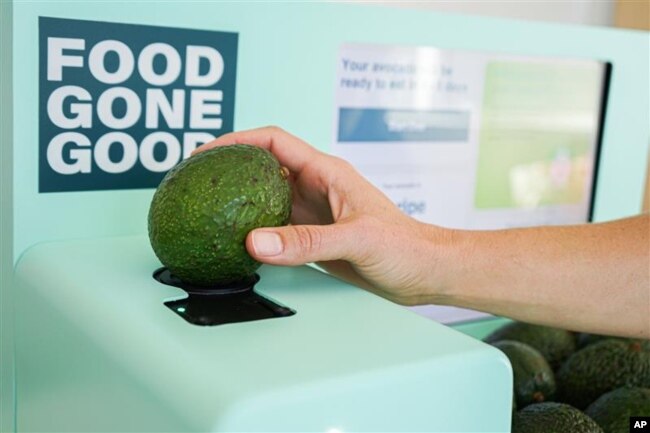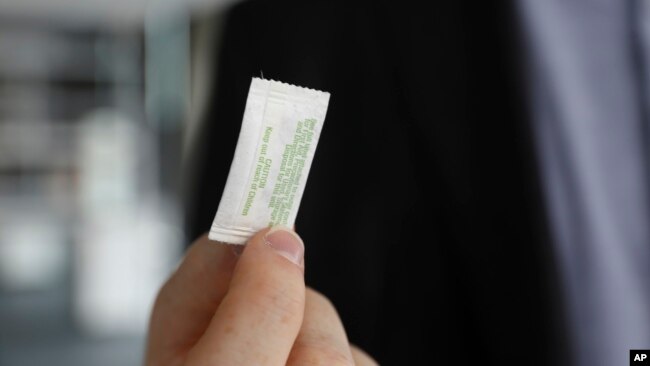化学、物理学で食品ロスに対処する企業
”MOTTAINAI" 世界共通言語となっています!!
3大欲求の1つである”食欲”。それは個人で抑制できます。過剰に購入しない。
そして、適正生産量に加えて、少量販売、賞味期限を延ばす技術で莫大な食品廃棄を減らすことができます。
財政だけでなく、廃棄物から放出されるメタンガスによる環境問題にも対処できることですね!
VOAで英語を学びましょう!!
企業が食品廃棄物に対応する技術を開発(和訳)
Companies Develop Technologies to Deal with Food Waste
Dec.18,2022
レストランや農家、フードビジネスでは、食品廃棄の問題に対処するため、化学や物理学に目を向けています。
ある企業は、食品の鮮度を保つために、果物やパックのripening熟成プロセスを遅らせるためのpackets包みをテストしています。また、他の会社は肉が安全に食べられるかどうかを判断するためのデジタルセンサーを開発しています。
背景
専門家によると、食品廃棄のコストに対する意識の高まりから、この問題に対処するための取り組みが活発化しています。ReFedは食品廃棄物に関する研究を行っている団体です。それによると、この問題に対処するために、2021年には2020年の2倍となる3000億円が新たなビジネスで調達されたと言います。
※ReFed
同団体の推計によると、2019年、米国で入手できる食品の約35%—約4180億ドル相当—が売れ残ったり、食べられなかったりしたと見積もっています。米国環境保護庁は、食品廃棄物は地域の廃棄物置き場に置かれる物質の中で最大の種類であると言います。そして、腐った食品はメタンガスを発生させ、環境には良くないと同機関は指摘しています。
ReFed社は、ハイテクを駆使した特殊なカバーで、毎年22万5千キログラムの食品を廃棄物置き場に置かないようにできると見積もっています。
多くの企業が、食品廃棄物の削減を支援する方法に取り組んでいます。
スウェーデンのイノセンティア社は、容器内に蓄積された微生物を測定することで、肉が安全に食べられるかどうかを示すセンサーを開発しています。また、米国とベルギーを拠点とするRyp Labs社は、ガスを放出して熟成を遅らせる果物や野菜のステッカーに取り組んでいます。
SavrPak社は、容器の中に入れて水分を取り込み、中の食品をより高温でパリッとさせる植物性のパケットを開発しています。
課題
しかし、企業や買い物客によっては、コストがネックになることもあり得ます。米国最大の食品販売会社であるクローガー社は、今年アピール・サイエンス社との契約を打ち切りました。クローガー社は、新鮮さを保つためにアピール・サイエンス社の特殊な被覆を施した果物に対して、買い物客が高いお金を払いたがらないという理由で、この契約を打ち切ったと言っています。
アピール社は、その特殊な被覆は一般的な食品添加物でできていると言います。アボカドなら数日、オレンジなら数週間はもつと言います。同社は、他の将来の技術についてクローガー社と話を続けていると言っています。
また、食品の種類によって必要な手入れが異なるため、廃棄を防ぐためにどのように対処するかも大きな課題です。
ミシガン州立大学農学部のランディ・ボードリー氏は、「状況を改善できるような大きな変化は1つもありません」と述べています。
ボードリー氏は、この問題の複雑さが、いくつかの食品廃棄物プロジェクトを失敗させる原因になっていると述べています。また、新しい企業が外部の研究者とデータを共有するとは限らないため、どの技術が最も効果的かを選別するのも難しいとも述べています。
中には、実績のある技術を新しい方法で利用する方が良いと考える企業もあります。
たとえば、シカゴに本社を置くヘイゼル・テクノロジーズ社は、1-MCPという、果物の熟成を遅らせるために室内で使用する化学化合物を販売してきました。同社は現在、1-MCPを果物の入った小さな容器にゆっくりと放出できるパックを販売しています。
マイク・メイジー氏は、ミシガン州ベルディングにある大規模なリンゴ包装施設BelleHarvestを監督しています。彼は今年、化合物で処理された部屋に入りきらないリンゴに使用するため、約3,000個のパックを注文しました。
「a bushel 1房のリンゴからもう1週間収穫できるのなら、そうしない手はないでしょう?」と彼は言います。「絶対に差が出ます。」
科学は有望ですが、それは解決策の一部に過ぎないとイヴェット・カブレラ氏は言います。彼女はNatural Resources Defense Councilの食品廃棄物担当ディレクターです。
食品廃棄物のほとんどは家庭で発生すると彼女は言います。食品のサイズを小さくする、少量買う、鮮度期限の精度を上げる、などは新しい技術よりもさらに大きな効果がある可能性があります。
「社会全体として、私たちは食品を本来あるべき姿では評価していません。」と、カブレラ氏は言います。
Companies Develop Technologies to Deal with Food Waste
Restaurants, farmers, and food businesses are turning to chemistry and physics to deal with the problem of food waste.
Some companies are testing coverings to slow the ripening process in fruit and packets to keep food fresh. Others are developing digital sensors that can tell when meat is safe to eat.
Background
Experts say growing awareness of the costs of food waste has led to more efforts to deal with the problem. ReFed is a group that studies food waste. It says new businesses have raised $300 billion in 2021, double the amount raised in 2020, to deal with the problem.
The group estimates that in 2019, around 35 percent of food available in the U.S. — worth about $418 billion — went unsold or uneaten. The U.S. Environmental Protection Agency says that food waste is the largest kind of material placed in local waste areas. And the agency notes that rotting food releases methane, a gas that is not good for the environment.
ReFed estimates 225,000 kilograms of food could be kept out of waste areas each year with special, high-tech coverings.
Many companies are working on ways to help reduce food waste.
Sweden-based Innoscentia is developing a sensor that can show if meat is safe to eat by measuring the buildup of microbes inside its container. And Ryp Labs, based in the U.S. and Belgium, is working on a sticker for fruits and vegetables that would release gas to slow ripening.
SavrPak has developed a plant-based packet that can fit inside a container and take in moisture, helping keep the food inside hotter and crispier.
Issues
But the cost can be a barrier for some companies and shoppers. Kroger, the largest food-store company in the U.S., ended its deal with Apeel Sciences this year. The deal ended because Kroger said shoppers were not willing to pay more for fruits with Apeel’s special covering to keep them fresh.
Apeel says its special covering is made of common food additives. It says treated avocados can last a few extra days, while treated oranges can last for several weeks. The company says that it continues to talk to Kroger about other future technology.
Another big issue is how to deal with different care requirements for different kinds of food to prevent waste.
“There is no one major change that can improve the situation,” said Randy Beaudry of Michigan State University’s school of agriculture.
Beaudry said the complexity of the issue has caused some food waste projects to fail. He added that it is also hard to sort out which technology works best since new companies do not always share data with outside researchers.
Some companies find it better to use proven technology in new ways.
For example, Chicago-based Hazel Technologies has been selling a chemical compound, called 1-MCP, that is used in a room to slow the ripening process in fruit. The company now sells packets that can slowly release 1-MCP into small containers of fruits.
Mike Mazie oversees BelleHarvest, a large apple packing facility in Belding, Michigan. He ordered around 3,000 of the packets this year to use for apples that could not fit inside rooms treated with the compound.
“If you can get another week out of a bushel of apples, why wouldn’t you?” he said. “It absolutely makes a difference.
The science is promising, but it is only part of the solution, said Yvette Cabrera. She is the director of food waste for the Natural Resources Defense Council.
Most food waste happens at home, she said. Reducing food sizes, buying smaller quantities, or improving the accuracy of freshness date could have even more effects than new technology.
“Overall as a society, we don’t value food as it should be valued,” Cabrera said.
Words in This Story
ripen – v. to become ripe and ready to eat
packet – n. a small, thin package
moisture – n. a small amount of a liquid (such as water) that makes something wet or moist
crisp – adj. pleasantly firm and making a sharp sound when chewed or crushed
pack – v. to put (something) into a box or other container so that it can be moved, stored, or protected
bushel – n. a unit for measuring an amount of fruit and grain that is equal to about 35.2 liters in the U.S. and to about 36.4 liters in the U.K.

